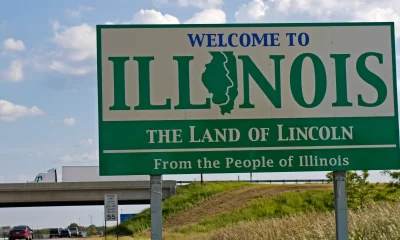Business
Missouri Legislator Introduces Psilocybin Bill

A Missouri Representative recently introduced legislation that would allow psilocybin as a treatment option for qualifying patients.
Missouri Rep. Tony Lovasco introduced House Bill 869 on Jan. 18 that would allow psilocybin therapy, which is a revised version of a bill that he introduced in 2022.
Under the current bill text, it would allow patients to use psilocybin to treat conditions such as depression or post-traumatic stress disorder, as well as those who are terminally ill and suffering from mental health. It would also cover patients who have undergone treatments for other conditions that were unsuccessful.
Lovasco described his bill as “a first step to addressing pervasive mental health crises that affect every sector of our society and economy by creating access to clinically validated therapies,” Lovasco stated in a press release. “I am especially encouraged at clinical research suggesting psilocybin may be a tool to address our opiate addiction crisis.”
Under HB 869, the Department of Health and Senior Services (DHSS) would be in charge of regulating psilocybin therapy, including opening up the treatment option to other qualifying conditions in the future. Anyone would be able to petition the DHSS to include a new condition that “benefits persons with the proposed condition in a manner equal to or greater than the benefit.”
Lovasco’s previous iteration of the bill, House Bill 2850, was introduced on March 1, 2022. It was given a hearing at the House Health and Mental Health Policy Committee on March 28, 2022, but did not move forward after that. The text originally mentioned ibogaine and mescaline, which has since been removed.
HB-869 now allows treatment options to expand if psilocybin is rescheduled under the Controlled Substances Act. If rescheduling occurs, it would allow any Missourian to become a patient as long as they are 21 or older to be eligible.
Although it’s uncertain what the fate of HB-869 will be, the topic of psilocybin has been ramping up in the U.S. and beyond.
In September 2022, the Missouri House Interim Committee on Veterans Mental Health and Suicide heard from Rahul Kapur, a physician, and numerous advocates about the potential benefits of psychedelics. “We, as fellow human beings and fellow Americans, owe our fellow countrymen and women our unqualified help to heal their mind, body and spirit—to honor their sacrifices in their family sacrifices,” Kapur said. “We have an obligation to keep exploring and providing them with any resources we have at our disposal. And, in my opinion, psychedelics are a key resource in this fight.”
Earlier this month, Missouri Rep. Michael Davis filed legislation that would amend the Right to Try Act, which was signed in 2018, so that it would allow patients to use psilocybin, ibogaine, or LSD as a treatment. “There is emerging interest and significant clinical research supporting the safety and efficacy of psychedelic drugs for PTSD, traumatic injury therapy and numerous other conditions,” Davis said in a press statement. “Because the [Food and Drug Administration] has not taken action to reschedule these drugs and make them generally available, I am working to make these drugs available through Missouri’s investigational drug access statute.”
Missouri is just one of many states seeking to open up access to psychedelic medicine. On Dec. 27, 2022, the Oregon Health Authority finalized rules for its Psilocybin Services Act, two years after voters passed the ballot in November 2020.
Researchers continued to study psilocybin as a medical treatment as well and continue to build up evidence of its effectiveness. The first take-home psilocybin trial in North America was approved in Canada in November 2022. The results of a double-blind trial published in the New England Journal of Medicine in the same month, which revealed evidence that psilocybin is effective in treating severe depression. An Australian study recently published findings on how psilocybin can ease the stress of MRIs, with one patient describing the experience as “magical.”
Source: https://hightimes.com/news/missouri-legislator-introduces-psilocybin-bill/
Business
New Mexico cannabis operator fined, loses license for alleged BioTrack fraud

New Mexico regulators fined a cannabis operator nearly $300,000 and revoked its license after the company allegedly created fake reports in the state’s traceability software.
The New Mexico Cannabis Control Division (CCD) accused marijuana manufacturer and retailer Golden Roots of 11 violations, according to Albuquerque Business First.
Golden Roots operates the The Cannabis Revolution Dispensary.
The majority of the violations are related to the Albuquerque company’s improper use of BioTrack, which has been New Mexico’s track-and-trace vendor since 2015.
The CCD alleges Golden Roots reported marijuana production only two months after it had received its vertically integrated license, according to Albuquerque Business First.
Because cannabis takes longer than two months to be cultivated, the CCD was suspicious of the report.
After inspecting the company’s premises, the CCD alleged Golden Roots reported cultivation, transportation and sales in BioTrack but wasn’t able to provide officers who inspected the site evidence that the operator was cultivating cannabis.
In April, the CCD revoked Golden Roots’ license and issued a $10,000 fine, according to the news outlet.
The company requested a hearing, which the regulator scheduled for Sept. 1.
At the hearing, the CCD testified that the company’s dried-cannabis weights in BioTrack were suspicious because they didn’t seem to accurately reflect how much weight marijuana loses as it dries.
Company employees also poorly accounted for why they were making adjustments in the system of up to 24 pounds of cannabis, making comments such as “bad” or “mistake” in the software, Albuquerque Business First reported.
Golden Roots was fined $298,972.05 – the amount regulators allege the company made selling products that weren’t properly accounted for in BioTrack.
The CCD has been cracking down on cannabis operators accused of selling products procured from out-of-state or not grown legally:
- Regulators alleged in August that Albuquerque dispensary Sawmill Sweet Leaf sold out-of-state products and didn’t have a license for extraction.
- Paradise Exotics Distro lost its license in July after regulators alleged the company sold products made in California.
Golden Roots was the first alleged rulebreaker in New Mexico to be asked to pay a large fine.
Source: https://mjbizdaily.com/new-mexico-cannabis-operator-fined-loses-license-for-alleged-biotrack-fraud/
Business
Marijuana companies suing US attorney general in federal prohibition challenge

Four marijuana companies, including a multistate operator, have filed a lawsuit against U.S. Attorney General Merrick Garland in which they allege the federal MJ prohibition under the Controlled Substances Act is no longer constitutional.
According to the complaint, filed Thursday in U.S. District Court in Massachusetts, retailer Canna Provisions, Treevit delivery service CEO Gyasi Sellers, cultivator Wiseacre Farm and MSO Verano Holdings Corp. are all harmed by “the federal government’s unconstitutional ban on cultivating, manufacturing, distributing, or possessing intrastate marijuana.”
Verano is headquartered in Chicago but has operations in Massachusetts; the other three operators are based in Massachusetts.
The lawsuit seeks a ruling that the “Controlled Substances Act is unconstitutional as applied to the intrastate cultivation, manufacture, possession, and distribution of marijuana pursuant to state law.”
The companies want the case to go before the U.S. Supreme Court.
They hired prominent law firm Boies Schiller Flexner to represent them.
The New York-based firm’s principal is David Boies, whose former clients include Microsoft, former presidential candidate Al Gore and Elizabeth Holmes’ disgraced startup Theranos.
Similar challenges to the federal Controlled Substances Act (CSA) have failed.
One such challenge led to a landmark Supreme Court decision in 2005.
In Gonzalez vs. Raich, the highest court in the United States ruled in a 6-3 decision that the commerce clause of the U.S. Constitution gave Congress the power to outlaw marijuana federally, even though state laws allow the cultivation and sale of cannabis.
In the 18 years since that ruling, 23 states and the District of Columbia have legalized adult-use marijuana and the federal government has allowed a multibillion-dollar cannabis industry to thrive.
Since both Congress and the U.S. Department of Justice, currently headed by Garland, have declined to intervene in state-licensed marijuana markets, the key facts that led to the Supreme Court’s 2005 ruling “no longer apply,” Boies said in a statement Thursday.
“The Supreme Court has since made clear that the federal government lacks the authority to regulate purely intrastate commerce,” Boies said.
“Moreover, the facts on which those precedents are based are no longer true.”
Verano President Darren Weiss said in a statement the company is “prepared to bring this case all the way to the Supreme Court in order to align federal law with how Congress has acted for years.”
While the Biden administration’s push to reschedule marijuana would help solve marijuana operators’ federal tax woes, neither rescheduling nor modest Congressional reforms such as the SAFER Banking Act “solve the fundamental issue,” Weiss added.
“The application of the CSA to lawful state-run cannabis business is an unconstitutional overreach on state sovereignty that has led to decades of harm, failed businesses, lost jobs, and unsafe working conditions.”
Business
Alabama to make another attempt Dec. 1 to award medical cannabis licenses

Alabama regulators are targeting Dec. 1 to award the first batch of medical cannabis business licenses after the agency’s first two attempts were scrapped because of scoring errors and litigation.
The first licenses will be awarded to individual cultivators, delivery providers, processors, dispensaries and state testing labs, according to the Alabama Medical Cannabis Commission (AMCC).
Then, on Dec. 12, the AMCC will award licenses for vertically integrated operations, a designation set primarily for multistate operators.
Licenses are expected to be handed out 28 days after they have been awarded, so MMJ production could begin in early January, according to the Alabama Daily News.
That means MMJ products could be available for patients around early March, an AMCC spokesperson told the media outlet.
Regulators initially awarded 21 business licenses in June, only to void them after applicants alleged inconsistencies with how the applications were scored.
Then, in August, the state awarded 24 different licenses – 19 went to June recipients – only to reverse themselves again and scratch those licenses after spurned applicants filed lawsuits.
A state judge dismissed a lawsuit filed by Chicago-based MSO Verano Holdings Corp., but another lawsuit is pending.
Source: https://mjbizdaily.com/alabama-plans-to-award-medical-cannabis-licenses-dec-1/
-

 Business2 years ago
Business2 years agoPot Odor Does Not Justify Probable Cause for Vehicle Searches, Minnesota Court Affirms
-

 Business2 years ago
Business2 years agoNew Mexico cannabis operator fined, loses license for alleged BioTrack fraud
-

 Business2 years ago
Business2 years agoAlabama to make another attempt Dec. 1 to award medical cannabis licenses
-

 Business2 years ago
Business2 years agoWashington State Pays Out $9.4 Million in Refunds Relating to Drug Convictions
-

 Business2 years ago
Business2 years agoMarijuana companies suing US attorney general in federal prohibition challenge
-

 Business2 years ago
Business2 years agoLegal Marijuana Handed A Nothing Burger From NY State
-

 Business2 years ago
Business2 years agoCan Cannabis Help Seasonal Depression
-

 Blogs2 years ago
Blogs2 years agoCannabis Art Is Flourishing On Etsy













